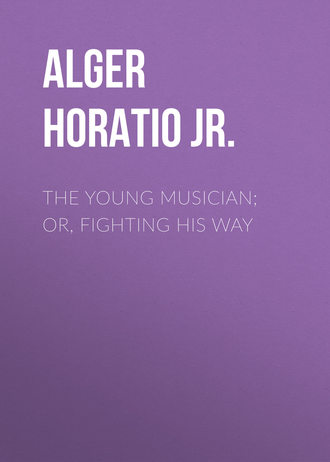
Alger Horatio Jr.
The Young Musician; Or, Fighting His Way
CHAPTER XXXVIII. AN OFFER DECLINED
After his interview with Squire Pope, Philip came down to the office, where he saw Professor Riccabocca, apparently waiting for him.
“Well, Mr. Gray, where shall we go next?” asked the professor, with suavity.
“I haven’t decided where to go—have you?” asked Philip coolly.
“I suppose we had better go to Raymond. That is a good-sized place. I think we can get together a good audience there.”
“You seem to be under the impression that we are in partnership,” said Philip.
“Of course,” answered Riccabocca.
“I have made no agreement of that sort, professor.”
“But, of course, it is understood,” said Riccabocca quickly, “as long as we draw so well.”
“You must excuse me, Professor Riccabocca. I must decline the proposal.”
“But why?” inquired the professor anxiously.
“I hope you won’t press me for an explanation.”
“But I do. I can’t understand why you should act so against your own interest. You can’t expect people will come just to hear you play. You need me to help you.”
“It may be as you say, professor, but if you insist upon my speaking plainly, I don’t care to travel with a man who has treated me as you have.”
“I don’t understand you,” said Riccabocca nervously; but it was evident, from his expression, that he did.
“Then you seem very forgetful,” said Philip. “You tried to deprive me of my share of the proceeds of the entertainment at Wilkesville, and would have succeeded but for a lucky accident.”
“I told you that it was all owing to neuralgia,” said Professor Riccabocca. “I had such an attack of neuralgic headache that it nearly drove me wild.”
“Then,” said Philip, “I would rather find a partner who is not troubled with neuralgic headache. I think it would be safer.”
“It won’t happen again, Mr. Gray, I assure you,” said the professor apologetically.
He endeavored to persuade Philip to renew the combination, but our hero steadily refused. He admitted that it might be to his pecuniary advantage, but he had lost all confidence in the eminent professor, and he thought it better to part now than to give him another opportunity of playing a similar trick upon him.
The professor thereupon consulted the landlord as to whether it would be advisable for him to give another entertainment unaided, and was assured very emphatically that it would not pay expenses.
“You make a great mistake, Mr. Gray,” said Riccabocca. “It would be a great advantage for you to have my assistance at this stage of your professional career.”
“I don’t expect to have any professional career,” answered Philip.
“Don’t you intend to become a professional musician?” asked the professor, surprised.
“Probably not. I have only been playing because I needed money, and my violin helped me to a living.”
“You can’t make as much money in any other way.”
“Not at present; but I want to get a chance to enter upon some kind of business. I am going to New York.”
“You will some time have a chance to hear me there, in the Academy of Music,” said Riccabocca pompously.
“I will go and hear you,” said Philip, laughing, “if I can afford a ticket.”
“Say the word and we will appear there together, Mr. Gray.”
“I think not, professor.”
In fact, though Philip had found himself unexpectedly successful as a musician, he knew very well that he was only a clever amateur, and that years of study would be needed to make him distinguished.
He was glad that he had the means of paying his expenses for a considerable time, and had in his violin a trusty friend upon which he could rely in case he got into financial trouble. Directly after breakfast he set out on his journey.
CHAPTER XXXIX. AN AMBITIOUS WAYFARER
The large sums which Philip had received for his playing might have dazzled a less sensible boy. He was quite conscious that he played unusually well for a boy, but when it came to selecting music as a profession, he felt it would not be wise to come to too hasty a decision. To be a commonplace performer did not seem to him very desirable, and would not have satisfied his ambition.
He had told Professor Riccabocca that he intended to go to New York. This design had not been hastily formed. He had heard a great deal of the great city in his home in the western part of the State of which it was the metropolis, and he was desirous of seeing it. Perhaps there might be some opening for him in its multitude of business houses.
Philip had plenty of money, and could easily have bought a railroad ticket, which would have landed him in New York inside of twenty-four hours, for he was only about four hundred miles distant; but he was in no hurry, and rather enjoyed traveling leisurely through the country towns, with his violin in his hand.
It reminded him of a biography he had read of the famous Doctor Goldsmith, author of the “Vicar of Wakefield,” who made a tour on the continent of Europe, paying his way with music evoked from a similar instrument.
Three days later, he found himself on the outskirts of a village, which I will call Cranston. It was afternoon, and he had walked far enough to be tired.
He was looking about for a pleasant place to lounge, when his attention was drawn to a boy of about his own age, who was sitting on the stone wall under a large tree.
He was rather a slender boy, and had originally been well dressed, but his suit was travel-stained, and covered with dust.
Now, boys have a natural attraction for each other, and Philip determined to introduce himself to the stranger. This he did in boy-fashion, by saying:
“Hello!”
“Hello!” said the stranger, looking up.
But he spoke slowly and wearily, and to Philip he seemed out of spirits.
“Do you live in Cranston?” asked Philip, taking a seat beside the other boy, upon the top of the stone wall.
“No; do you?”
“No.”
“Where do you live?”
“I don’t live anywhere just at present,” answered Philip, with a smile. “I am traveling.”
“So am I,” said the other boy.
“I am traveling to New York,” Philip continued.
“And I am traveling from there,” said his new acquaintance.
Then both boys surveyed each other curiously.
“What’s your name?” asked the stranger.
“Philip Gray. What’s your’s?”
“Mine is Henry Taylor. What have you got there?”
“A violin.”
“Do you play on it?”
“Yes; a little.”
“I should think you’d be tired lugging it round.”
Philip smiled.
“It is about all the property I have,” he said; “so it won’t do for me to get tired of it.”
“You’re richer than I am, then,” said Henry.
“Are you poor, then?” asked Philip, in a tone of sympathy.
“I haven’t got a cent in my pocket, and I haven’t had anything to eat since breakfast.”
“Then I’m glad I met you,” said Philip warmly. “I will see that you have a good supper. How long is it since you left New York?”
“About a week.”
“What made you leave it?”
Henry Taylor hesitated, and finally answered, in a confused tone:
“I’ve run away from home. I wanted to go out West to kill Indians.”
Philip stared at his new acquaintance in astonishment.
CHAPTER XL. THE INDIAN HUNTER
Philip had lived so long in a country village that he had never chanced to read any of those absorbing romances in which one boy, of tender years, proves himself a match for a dozen Indians, more or less, and, therefore, he was very much amazed at Henry Taylor’s avowal that he was going out West to kill Indians.
“What do you want to kill Indians for?” he asked, after an astonished pause.
Now it was Henry’s turn to be astonished.
“Every boy wants to kill Indians,” he answered, looking pityingly at our hero.
“What for? What good will it do?” asked Philip.
“It shows he’s brave,” answered his new friend. “Didn’t you ever read the story of ‘Bully Bill’; or, The Hero of the Plains’?”
“I never heard of it,” said Philip.
“You must have lived in the woods, then,” said Henry Taylor, rather contemptuously. “It’s a tip-top story. Bully Bill was only fourteen, and killed ever so many Indians—twenty or thirty, I guess—as well as a lot of lions and bears. Oh, he must have had lots of fun!”
“Why didn’t the Indians kill him?” asked Philip, desirous of being enlightened. “They didn’t stand still and let him kill them, did they?”
“No; of course not. They fought awful hard.”
“How did one young boy manage to overcome so many Indians?”
“Oh, you’ll have to read the story to find out! Bully Bill was a great hero, and everybody admired him.”
“So you wanted to imitate his example?” asked Philip.
“To be sure I did.”
“How did you happen to get out of money?”
“Well,” said Henry, “you see me and another boy got awful excited after reading the story, and both concluded nothing could make us so happy as to go out West together, and do as Bill did. Of course, it was no use to ask the old man—”
“The old man?” queried Philip.
“The gov’nor—father, of course! So we got hold of some money—”
“You got hold of some money?” queried Philip.
“That’s what I said, didn’t I?” rejoined Henry irritably.
“Yes.”
“Then what’s the use of repeating it?”
Philip intended to ask where or how Henry got hold of the money, but he saw pretty clearly that this would not be agreeable to his new acquaintance. Though without much experience in the world, he suspected that the money was not obtained honestly, and did not press the question.
“Well, me and Tom started about a week ago. First of all, we bought some revolvers, as, of course, we should need them to shoot Indians. They cost more than we expected, and then we found it cost more to travel than we thought.”
“How much money did you have?”
“After paying for our revolvers, Tom and me had about thirty dollars,” said Henry.
“Only thirty dollars to go west with!” exclaimed Philip, in amazement.
“Why, you see, the revolvers cost more than we expected. Then we stopped at a hotel in Albany, where they charged us frightfully. That is where Tom left me.”
“Tom left you at Albany?”
“Yes, he got homesick!” said Henry contemptuously. “He thought we hadn’t money enough, and he said he didn’t know as he cared so much about killing Indians.”
“I agree with Tom,” said Philip. “I don’t think I should care very much about killing Indians myself, and I should decidedly object to being killed by an Indian. I shouldn’t like to be scalped. Would you?”
“Oh, I’d take care of that,” said Henry. “I wouldn’t let them have the chance.”
“It seems to me the best way would be to stay at home,” said Philip, smiling.
“If I stayed at home I’d have to go to school and study. I don’t care much about studying.”
“I like it,” said Philip. “So Tom left you, did he?”
“Yes; but I wasn’t going to give up so easy. He took half the money that was left, though I thought he ought to have given it to me, as I needed it more. I wasn’t going home just as I’d started.”
“Then you’ve spent all your money now?”
“Yes,” answered Henry gloomily. “Have you got much money?” he asked, after a pause.
“Yes, I have about a hundred dollars-say, ninety-five.”
“You don’t mean it!” ejaculated Henry, hie eyes sparkling.
“Yes, I do.”
“How did you get it?”
“I earned most of it by playing on the violin.”
“I say,” exclaimed Henry, in excitement, “suppose you and me go into partnership together, and go out West—”
“To kill Indians?” asked Philip, smiling.
“Yes! With all that money we’ll get along. Besides, if we get short, you can earn some more.”
“But what advantage am I to get out of it? I am to furnish all the capital and pay all expenses, as far as I can understand. Generally, both partners put in something.”
“I put in my revolver,” said Henry.
“One revolver won’t do for us both.”
“Oh, well, you can buy one. Come, what do you say?” asked Henry eagerly.
“Let me ask you a few questions first. Where does your father live?”
“In New York.”
“What is his business?”
“He is a broker in Wall Street.”
“I suppose he is rich?”
“Oh, he’s got plenty of money, I expect! We live in a nice house on Madison Avenue. That’s one of the best streets, I suppose you know!”
“I never was in New York. Is your mother living?”
“No,” answered Henry. “She died three years ago.”
If his mother had been living, probably the boy would never have made such an escapade, but his father, being engrossed by business cares, was able to give very little attention to his son, and this accounts in part for the folly of which he had been guilty.
“Have you got any brothers or sisters?” he asked.
“I have one sister, about three years younger than I. Her name is Jennie.”
“I wish I were as well off as you,” said Philip.
“How do you mean?”
“I mean I wish I had a father and sister.”
“Haven’t you?”
“My father is dead,” said Philip gravely, “and I never had a sister.”
“Oh, well, I don’t know as I’m so lucky,” said Henry. “Sisters are a bother. They want you to go round with them, and the old man is always finding fault.”
Philip’s relations with his father had always been so affectionate that he could not understand how Henry could talk in such a way of his.
“I don’t know what makes you ask me such a lot of questions,” said Henry, showing impatience. “Come, what do you say to my offer?”
“About forming a partnership?”
“Yes.”
“I’d rather not—in that way.”
“In what way?”
“I mean for the purpose of going out West to kill Indians.”
“You’ve no idea what fun it would be,” said Henry, disappointed.
“No, I suppose not,” said Philip, smiling.
“Then I suppose I shall have to give it up,” said Henry.
“Now I have a proposal to make to you,” said Philip.
“What is it?”
“If you agree to go home, I’ll pay your expenses and go along with you. I’ve never been to New York, and I’d like to have some one with me that could show me round the city.”
“I can do that,” said Henry. “I know the way all about.”
“Then will you agree?”
“Yes.”
“Then come along, and we’ll stop at the first convenient place and get some supper.”
CHAPTER XLI. AN ADVENTURE IN THE WOODS
“I shall do a good thing if I induce Henry to go home,” thought Philip. “That is rather a queer idea of his about wanting to kill Indians. It seems to me as much murder to kill an Indian as any one else.”
He only thought this, but did not express it, as he did not care to get into a discussion with his new acquaintance, lest the latter should recall his consent to go home.
“I say, Philip,” said Henry, who had now learned our hero’s name, “we ain’t in any hurry to go to New York, are we?”
“I thought we might take a train to-morrow morning, and go straight through.”
“But I’d rather take it easy, and travel through the country, and have adventures.”
“But you forget that your father will be anxious about you.”
“Yes, I suppose he will.”
“I’ll tell you what I’ll do. If you’ll write a letter to your father, and let him know that you are safe with me, I’ll do as you say.”
“All right,” said Henry, in a tone of satisfaction; “I’ll do it.”
“Father’ll pay you all you have to spend for me,” Henry added, after a moment’s pause.
“Very well; then I will be your banker.”
Philip was not foolish enough to protest that he did not care to be repaid. All he had in the world was a little less than a hundred dollars, and when that was gone he was not absolutely sure of making any more at once, though he felt tolerably confident that he could.
“Suppose you let me have ten dollars now,” suggested Henry.
“I think I would rather keep the money and pay the bills,” said Philip quietly.
He was not sure but that Henry, if he had a supply of money in his pockets, would reconsider his promise to go home and take French leave.
Of course, it would be extremely foolish, but his present expedition did not indicate the possession of much wisdom.
“I don’t see what difference it makes,” said Henry, looking dissatisfied.
“I won’t argue the point,” answered Philip good-naturedly.
“I wish I was in New York, near a good restaurant,” said Henry, after a pause.
“Oh. I forgot! You are hungry.”
“Awfully. I don’t believe there’s a hotel within two or three miles. I don’t think I can hold out to walk much farther.”
A few rods farther on was a farmhouse standing back from the road, old-fashioned-looking, but of comfortable aspect.
A young girl appeared at the side door and rang a noisy bell with great vigor.
“They’re going to have supper,” said Henry wistfully. “I wish it was a hotel!”
Philip had lived in the country, and understood the hospitable ways of country people.
“Come along, Henry,” he said. “I’ll ask them to sell us some supper. I am sure they will be willing.”
Followed by his new acquaintance, he walked up to the side door and knocked—for there was no bell.
The young girl—probably about Philip’s age—opened the door and regarded them with some surprise.
Philip bowed.
“Will you be kind enough to tell us if there is any hotel near-by?” he asked.
“There’s one about three miles and a half farther on.”
Henry groaned inwardly.
“I am going to ask you a favor,” said Philip. “My friend and I have traveled a considerable distance, and stand in need of supper. We are willing to pay as much as we should have to at a hotel, if you will let us take supper here.”
“I’ll ask mother,” said the young girl.
And forthwith she disappeared. She came back in company with a stout, motherly-looking woman. Philip repeated his request.
“Why, to be sure,” she said heartily. “We always have enough, and to spare. Come right in, and we’ll have supper as soon as the men-folks come in.”
They entered a neat kitchen, in the middle of which was set out a table, with a savory supper upon it. Henry’s eyes sparkled, and his mouth watered, for the poor boy was almost famished.
“If you want to wash come right in here,” said the farmer’s wife, leading the way into a small room adjoining.
The two boys gladly availed themselves of the permission, though Henry would not have minded sitting right down, dusty as he was. However, he felt better after he had washed his face and bands and wiped them on the long roll towel that hung beside the sink.
They were scarcely through, when their places were taken by the farmer and his son, the latter a tall, sun-burned young man, of about twenty, who had just come in from a distant field. The farmer’s wife soon explained the presence of the two young strangers.
“Sho!” said the farmer. “You’re pretty young to be travelin’. You ain’t in any business, be you?”
Henry was rather ashamed to mention that his business was killing Indians, though, as yet, he had not done anything in that line. He had an idea that he might be laughed at.
“I am a little of a musician,” said Philip modestly.
“Sho! do you make it pay?”
“Pretty well, so far; but I think when I get to New York I shall try something else.”
“Are you a musician as well as he?” asked the farmer of Henry.
“No, sir.”
“Come, father, you’d better sit down to supper, and do your talking afterward,” said the farmer’s wife.
So they sat down to the table, and all did full justice to the wholesome fare, particularly Henry, who felt absolutely ravenous.
Never at the luxurious home of his father, in Madison Avenue, had the wandering city boy enjoyed his supper as much as at the plain table of this country farmer.
The good mistress of the household was delighted at the justice done to her viands, considering it a tribute to her qualities as a cook.
When Philip produced his purse to pay for their supper, the farmer absolutely refused to receive anything. “But I would rather pay,” persisted our hero.
“Then I’ll tell you how you may pay. Give us one or two tunes on your violin.”
This Philip was quite willing to do, and it is needless to say that his small audience was very much pleased.
“I say,” said Henry, “you play well enough to give concerts.”
“I have done it before now,” answered Philip, smiling.
They were invited to spend the night, but desired to push on to the hotel, being refreshed by their supper and feeling able to walk three or four miles farther.
About half-way their attention was drawn to what appeared a deserted cabin in the edge of the woods, some twenty rods back from the road.
“I say, Philip,” said Henry, “there’s an old hut that looks as if nobody lived in it. Wouldn’t it be a lark for us to sleep there to-night? It would save the expense of lodging at the hotel, and would be an adventure. I haven’t had any adventures yet.”
“I have no objection,” said Philip. “We’ll go, at any rate, and look at it.”
They crossed the field, which seemed to have been only partially cleared, and soon reached the hut.
It was very bare within, but on the floor, in one corner, was a blanket spread out. There was a place for a window, but the sash had been removed, and it was easy to step in.
“I wonder how this blanket came here?” said Philip.
“Oh, I guess the last people that lived here left it!” returned Henry. “I say, Phil, I begin to feel tired. Suppose we lie down? I’m glad I haven’t got to walk any farther.”
Philip sympathized with his new friend; and so, without much parley, the two boys threw themselves down on the blanket, and were soon fast asleep.
How long Philip slept he didn’t know, but he was awakened by a terrible screech, and, opening his eyes, say Henry sitting bolt upright, with trembling limbs and distended eyeballs, gazing fearfully at a tall, muscular-looking Indian, who had just stepped into the cabin through the open window.







